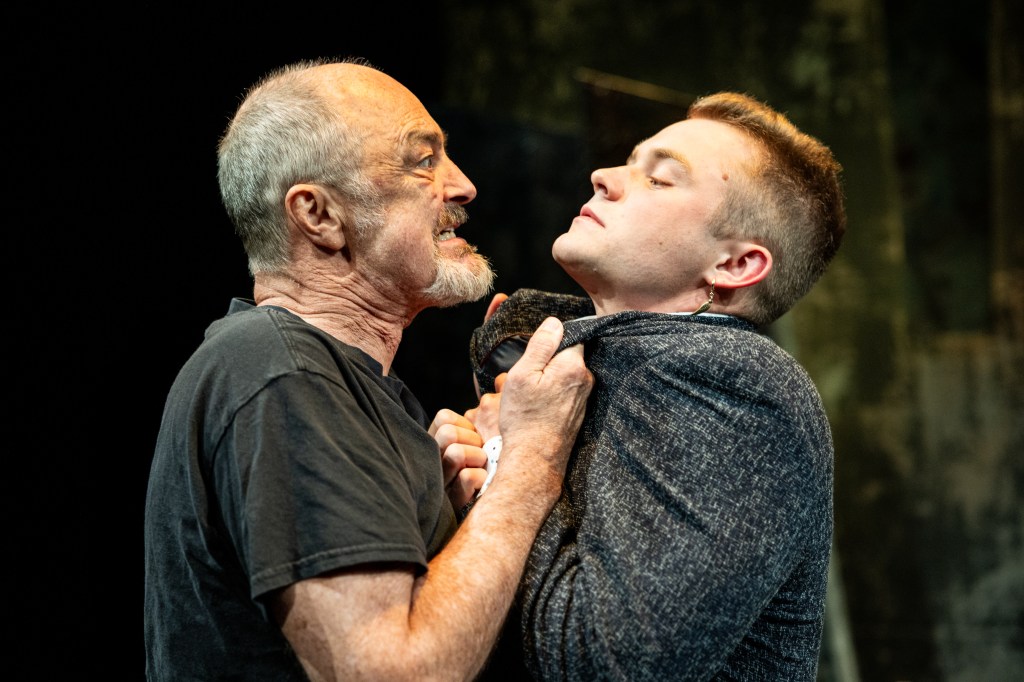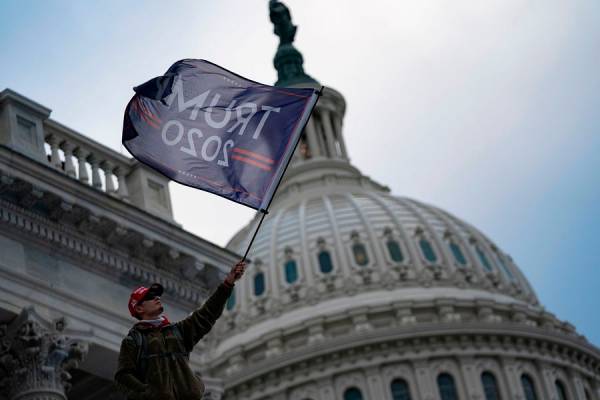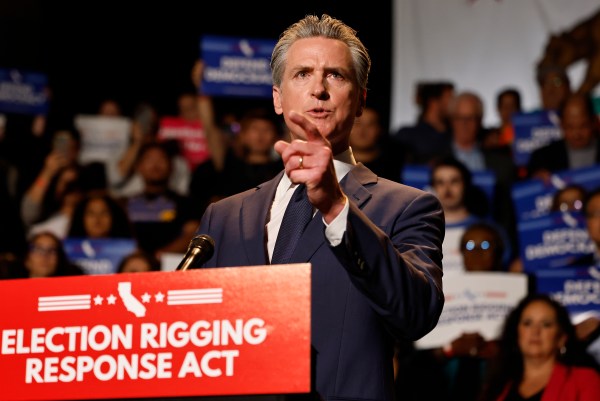At a Univision town hall last month, Donald Trump claimed there was “nothing done wrong at all” on January 6, 2021, and branded it a “day of love.” In an interview with Bloomberg News that same week, the former president described the “primary scene in Washington” that day as one of “love and peace” and peddled the lie that rioters were “waved into the Capitol by police.” They were, in his own words, “unbelievable patriots.”
Whatever the result of next week’s election, Trump’s efforts to rewrite history will continue. But if he is reelected, a considerable part of the Republican Party will fall behind him. Twenty-five percent of Americans already believe that the FBI “probably” or “definitely” orchestrated the Capitol attack. That number is only likely to increase if the truth is not vigorously upheld by those in public life who remain committed to it.
Stephen Sachs, a theater director and playwright, is one such figure. His new play, Fatherland, currently playing off-Broadway, confronts the tragic reality of January 6. It uses the disintegration of an ordinary American family to explore how the riot, its aftermath, and the relentless denial of reality that led to it have deepened our crises of division and distrust.
The play follows the true story of Guy Reffitt, a family man from Wylie, Texas, whose livelihood as a petroleum consultant fell apart after the price of oil plummeted in the mid-2010s. Jobless and relegated to sleeping on an air mattress with his wife and three children, he became drawn to Trump’s unfiltered and pugilistic politics of resentment in 2016. By 2020, Guy had adopted a steady media diet of Newsmax, Confederate Facebook forums, and obscure right-wing YouTube channels. He joined the Texas chapter of the Three Percenters, an extremist militia group, and began obsessively carrying a gun around the house. Fearing an impending civil war, he bought a generator and hoarded supplies like water and gasoline.
When Joe Biden won the presidential election, Guy was incensed. “Too many lines have been crossed,” he texted his family on Christmas Eve. The election had been stolen, and the only appropriate response was “to rise up the way the Constitution was written.” On January 6, he arrived at the Capitol equipped with body armor, a pistol, and zip-tie handcuffs. “We’re taking the Capitol before the day is over,” he proclaimed. “Ripping them out by their hair. Every f—ing one of them.”
Guy returned home exhilarated and offered a stark warning to his 18-year-old son, Jackson: “If you turn me in, you’re a traitor. And you know what happens to traitors. Traitors get shot.” The FBI raided the Reffitt house and arrested Guy a few days later. Jackson had sent them a tip about his father in December, when Guy began to speak ominously about planning “something big.” Later, Jackson gave the FBI a secret recording of Guy describing his role in the riot and pledging further violence. At Guy’s trial in 2022, Jackson testified against him.
Fatherland dramatizes the Reffitt trial in an intense yet modest fashion. A work of verbatim theater, its playbill declares that “every word” of dialogue “comes from court evidence, public statements, and the official court transcript of The United States vs. Guy Wesley Reffitt.” Jackson’s (Patrick Keleher) testimony reveals the events that led to the trial, with Guy (Ron Bottitta) appearing in flashbacks until the play’s climax. There are only two other characters: the prosecutor (Anna Khaja) and Guy’s defense attorney (Larry Poindexter).
For almost 90 minutes, Fatherland is driven exclusively by monologues and conversations. There are no effects beyond occasional flashing lights and audio clips from news broadcasts that boom over the theater’s speakers. The set is sparse, adorned for most of the play with only chairs and tables, which represent everything from seats in the courthouse to the barricades and bike racks that were hurled at police during the riot. When other props do appear—such as an AR-15, a duffle bag, and boxes of ammunition—they keep us connected to the harrowing reality of Guy’s actions.
At times Fatherland feels almost voyeuristic, as though we’re crouched outside the Reffitt house in darkness, peering in through the living room window to watch Guy and Jackson’s relationship decline into acrimony and suspicion. In the play’s most impressive scene, Guy recounts his experience on January 6 to Jackson, shouting his achievements beneath a burning red spotlight. He leaps around the stage with passionate fury, gesticulating wildly while spit erupts from his mouth. It’s the peak of an utterly arresting performance that never fails to convince.
In its raw presentation of working-class rage and disaffection, Fatherland evokes kitchen sink dramas of the ’50s and ’60s. Guy himself resembles a John Osborne character transposed to modern America and left to find purpose on its fringes. Rather than turning to his family, friends, or neighbors, he found it in forbidden corners of the internet, where members of the Three Percenters and the Oath Keepers promised a community united around the goal of saving the United States from total collapse. Fatherland explores how Guy’s need to fill the emptiness in his life led him to join these movements. By embracing their delusions and taking a leadership role in their ranks, he came to see himself as a central character in a story that would change the world.
At its heart, Fatherland is ultimately concerned with issues of family and loyalty. Jackson and Guy begin the play with an enviable bond, but their relationship decays beyond recognition as their ideological polarization deepens. After Guy’s arrest, Jackson struggles to convince his mother, his sisters, and even himself that he turned his father in for the good of American democracy and not simply to become the focus of a major media story. Guy came to see politics as a war between good and evil—and his family suffered for it. By the play’s conclusion, their relationships are left poisoned by distrust.
In recent years, it has become alarmingly common for political divisions to fracture families and communities. The current election cycle has amplified this trend. In Michigan, more than 25 percent of “active and likely voters” surveyed in a recent statewide poll said political disagreements had “ruined their relationships.” Partisan differences have even caused Democratic vice presidential nominee Tim Walz to grow estranged from his Republican brother.
Fatherland does not suggest a solution to this crisis or an answer to how other Americans can be kept from following Guy’s path toward extremism. In its portrayal of an ordinary man’s descent into zealotry and the damage that transformation inflicted on those around him, the play forces us to confront the tragedy of January 6 from a uniquely human perspective. It illuminates the social dysfunction that allowed Trump’s dangerous fantasies to consume so many people—and illustrates how these delusions could easily lead to greater chaos if left unchecked.









Please note that we at The Dispatch hold ourselves, our work, and our commenters to a higher standard than other places on the internet. We welcome comments that foster genuine debate or discussion—including comments critical of us or our work—but responses that include ad hominem attacks on fellow Dispatch members or are intended to stoke fear and anger may be moderated.
With your membership, you only have the ability to comment on The Morning Dispatch articles. Consider upgrading to join the conversation everywhere.